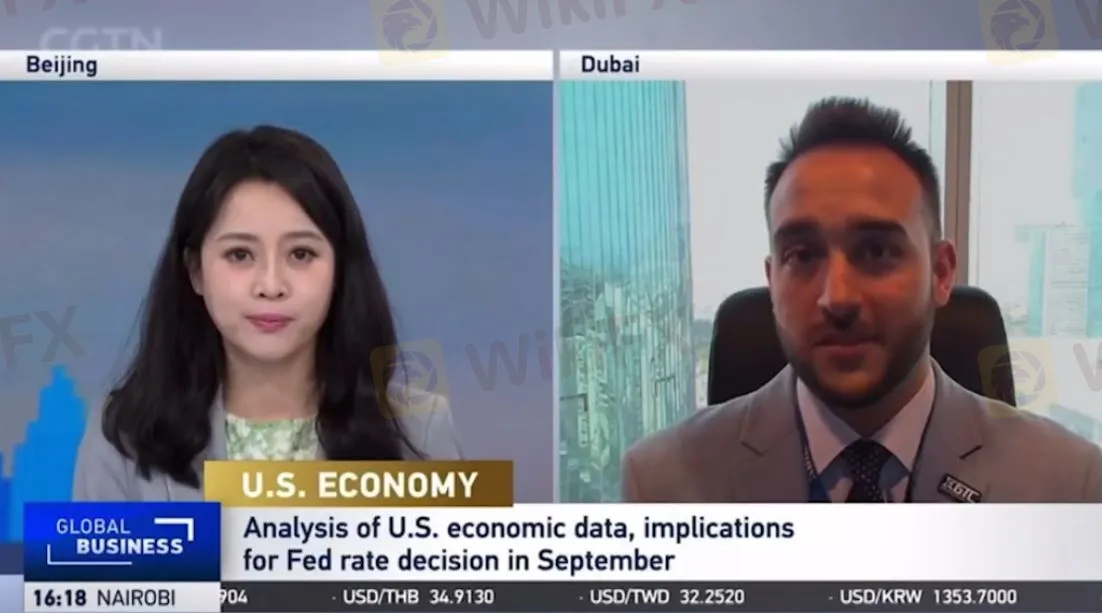简体中文
繁體中文
English
Pусский
日本語
ภาษาไทย
Tiếng Việt
Bahasa Indonesia
Español
हिन्दी
Filippiiniläinen
Français
Deutsch
Português
Türkçe
한국어
العربية
GTCFX Chief Analyst Featured on CGTN: Rising Expectations of Federal Reserve Rate Cuts and Renewed Debate on Real Estate Bubble
Abstract:U.S. Inflation Drops to Lowest Level in Over Two Years, Strengthening Expectations of a September Federal Reserve Rate Cut; Real Estate Market Hits Record High, Renewed Bubble Debate

Recently, the U.S. released data on the Consumer Price Index (CPI) for July, showing that the inflation rate has dropped to its lowest level in over two years, approaching a two-and-a-half-year historical low. This positive signal has heightened expectations of a rate cut in the Federal Reserve's upcoming September meeting. GTC Chief Analyst Jameel Ahmad noted that as the CPI continues to move closer to the Federal Reserve's 2% target, the Fed's resolve to lower interest rates in September has been further strengthened. This development has not only increased market expectations for more rate cuts within the year but also boosted investor confidence, with the gold market responding positively. Gold prices are nearing historical highs, and they are expected to maintain a strong trend in the short term.
At the same time, shocking news emerged from the U.S. real estate market. According to the latest research from Zillow, the price of typical entry-level homes in more than 200 cities across the U.S. has surpassed the one million dollar mark, setting a new historical high. This data has sparked widespread discussion and concern about a potential real estate bubble. Jameel Ahmad commented that although the term “bubble” is frequently mentioned, the global real estate market, including the U.S., has shown resilience and an ability to adapt to a high-interest-rate environment over the past year.
He further analyzed that the core challenge facing the current real estate market is the rapid rise in home prices and living costs, which has not been accompanied by corresponding wage growth, squeezing disposable income for residents. Particularly in the U.S., where mortgage terms are relatively long (typically 20 to 25 years), compared to the short-term fluctuations in the European market, this has provided a certain level of stability. However, he also acknowledged that for first-time homebuyers, the high prices have become an unavoidable obstacle, and he called for wage growth to better align with the actual needs of homebuyers.
In conclusion, the significant decline in the U.S. inflation rate provides strong support for a Federal Reserve rate cut, while the continued boom in the real estate market also brings with it discussions of bubble risks. Going forward, the market will closely monitor the Federal Reserve's policy actions and the subsequent developments in the real estate market to assess their impact on the global economic environment.
Disclaimer:
The views in this article only represent the author's personal views, and do not constitute investment advice on this platform. This platform does not guarantee the accuracy, completeness and timeliness of the information in the article, and will not be liable for any loss caused by the use of or reliance on the information in the article.
WikiFX Broker
Latest News
SQUARED FINANCIAL: Your Friend or Foe?
Big News! UK 30-Year Bond Yields Soar to 25-Year High!
High-Potential Investments: Top 10 Stocks to Watch in 2025
Why Is Nvidia Making Headlines Everywhere Today?
Discover How Your Trading Personality Shapes Success
US Dollar Insights: Key FX Trends You Need to Know
FINRA Charges UBS $1.1 Million for a Decade of False Trade Confirmations
BI Apprehends Japanese Scam Leader in Manila
Bitcoin in 2025: The Opportunities and Challenges Ahead
Join the Event & Level Up Your Forex Journey
Currency Calculator






